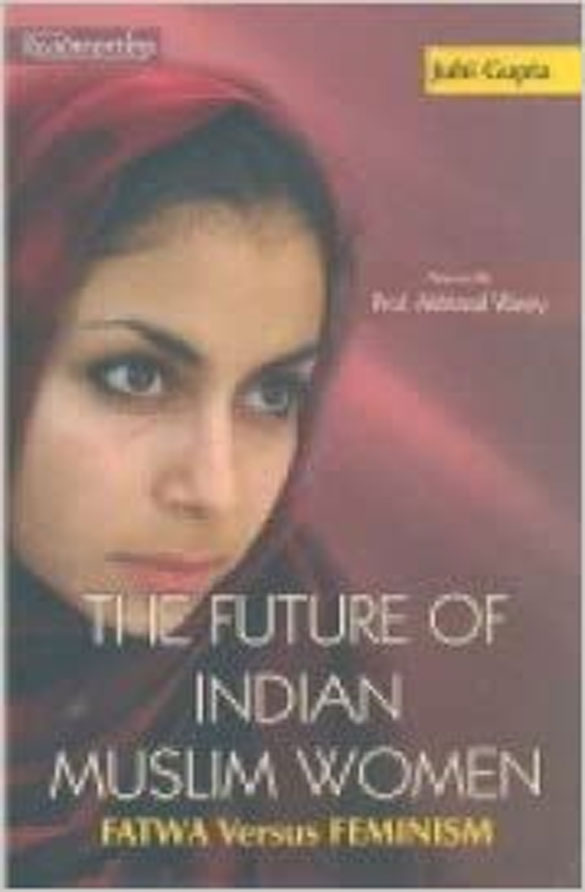‘The Future of Indian Muslim Women: Fatwa Versus Feminism’, Author, Juhi Gupta

By
Mushtaq Ul Haq Ahmad Sikander, New Age Islam
The
Future of Indian Muslim Women: Fatwa Versus Feminism,
Author:
Juhi Gupta
Publisher:
Readworthy Publications, New Delhi, India
Pages:
378
Price: Rs 1595
ISBN: 9789386228536
 Women
since time immemorial have been victims of gross abuse and atrocities. These
atrocities against women have been justified under different pretexts. They
include social norms, religion, and misogyny. Women have been bearing them,
accepting it as their fate, religious orders, or social responsibilities.
Indian Muslim women have been bearing their own burden of patriarchy and
misogyny like women of the world. But women in particular the Muslim women
confronted peculiar problems that were rooted in religion, culture, and social
milieu. Indian Muslim women are not a monolith so they face a plethora of
issues given their environment, region, and society. But they do confront some
general problems that are rooted in a selective interpretation of religion and
following the same school of jurisprudence. This misogynist interpretation of
Islam has resulted in disempowering women, and there are voices that now call
for the reinterpretation and even doing away with the misogynistic message of
constructed religion.
Women
since time immemorial have been victims of gross abuse and atrocities. These
atrocities against women have been justified under different pretexts. They
include social norms, religion, and misogyny. Women have been bearing them,
accepting it as their fate, religious orders, or social responsibilities.
Indian Muslim women have been bearing their own burden of patriarchy and
misogyny like women of the world. But women in particular the Muslim women
confronted peculiar problems that were rooted in religion, culture, and social
milieu. Indian Muslim women are not a monolith so they face a plethora of
issues given their environment, region, and society. But they do confront some
general problems that are rooted in a selective interpretation of religion and
following the same school of jurisprudence. This misogynist interpretation of
Islam has resulted in disempowering women, and there are voices that now call
for the reinterpretation and even doing away with the misogynistic message of
constructed religion.
Islam
has empowered women like any other despised section that existed at the time of
its revelation. But over the centuries whatever the rights Islam had granted to
women that empowered them and rendered them equal citizens were snatched away
by men who were rooted in a patriarchal culture. These men could not do away
with their patriarchal leanings when it came to the interpretation of Islam, so
they evolved an interpretation of Islam, its shariah, and jurisprudence
in a patriarchal manner. Against this patriarchy, undermining and opposing it
arose the movement of equality demanding equal rights, wages, status, and
opportunities for women known as feminism. Feminism as a movement was based on
secular tradition and values antagonistic to organized religion and God. It
evoked a huge response, and even some Muslim women scholars, jurists, and
theologians adopted it, but with massive changes. God and religion were central
to Islamic feminism. Islamic feminism as a movement again is not a monolith; it
has diverse leanings and outlooks.
The
present book written by a young academic and women studies scholar, Juhi Gupta
engages with the question of Indian Muslim women for whom religion is an
important aspect of their identity, culture, and whole life. Juhi discusses the
future of Indian Muslim women in the context of changing trends in society,
religious interpretation, and empowerment. Indian Muslim women are among the
most marginalized sections of the Indian society, and very few studies are
available about understanding them, their issues, how they view religion,
misogynistic interpretation of religion, and new trends aiming at empowering
them. Fatwa becomes essential because religion is the most potent driving force
that gives meaning to their lives. Feminism as the new trend both empowers and
threatens their religious understanding and roles.
In
his Foreword, Prof Akhtarul Wasey, a prominent scholar and academic writes,
“The basic premise of the book is that both Fatwa and Feminism, if applied in a
positive and constructive mode, are indispensable for implementing attitudinal
change among Indian Muslims in a bid to improve on the present status of their
women and hopefully, this is viable, considering the present trends.” Thus Prof
Wasey provides a gist of the book and what it covers regarding Muslim women.
Fatwa has been given a negative connotation by media, because all of them are rooted
in a certain medieval interpretation of Islam, that too in a sectarian context.
In contemporary times the context, social milieu, society, and issues have
changed but the jurists are trying to find answers in the same canonized and
fossilized juristic schools that lead to retrogressive results. These results
in the forms of Fatwas are then criticized by media as they are based on
redundant interpretation of Islam, not a dynamic one conducted through Ijtihaad.
In
her Preface, Juhi Gupta writes about the purpose and scope of the book in these
words, “My solemn intention of research on this topic is to throw enough light
on the present and future status of Indian Muslim women in face of the march of
fatwas and feminism, and to develop new insight into certain social
realities of India. The purpose of my research would be fulfilled if it could
draw any attention towards the plight of Muslim women in India and bring any
upliftment in their status.” (P-xii)
The
economic, social, educational, health, regional and specific problems of women
have been specified along with the reasons for the low participation of Muslim
women in politics. Literature survey about Muslim women in India has added to
the academic merit of the book. Juhi further discusses the role and status of
women in Islam while drawing the inference, “It may be noted that it does not
even associate sex with gender: There is not a single verse in the whole of the
Quran suggesting that biological differences existing between men and women
make them unequal.” P-54
The
issues related with Fatwas, their impact on masses particularly women
and misconceptions revolving around them are discussed too. While discussing
the role of Fatwas and the tryst of Ulema with them, Juhi writes,
“Ulema have never been the only educated class in the Islamic society
but because they explained Shariah to the public, they used their moral
power to control political clout and their role in politics surpassed that of
any philosopher or natural scientist. The significance of traditional
Fatwa can be judged adequately in the light of Islamic history which highlights
that a number of renowned Islamic scholars refused to accept the most
prestigious and coveted official positions offered by ruling powers of the day
in order to resist their whims. Actually, some of them were killed for their
refusal. In fact, the history of Fatwa is the history of Muslim Ummah’s
quest to seek Allah’s pleasures, frequently at the cost of one’s life.” P-118
Media
has always been painting Fatwas in a wrong color although there are Fatwas
that do condemn domestic violence, dowry, female feticide but they are hardly
covered by the media. Instead, patriarchal fatwas related Sania Mirza,
Gudiya, Imrana, Taslima Nasreen are given huge publicity and coverage as they
help in reinforcing Islamophobia. But Juhi also condemns the Fatwa giving
institutions for their callous approach, “But if a fatwa is only for
consumption a particular person who queried in his/her specific context, why
print their collections or post them without any qualification on the web for
global publicity and cross-referencing? The problem of context is ever so
intriguing yet unnoticed.” P-159
Juhi
also discusses fatwas as tools of progress and women empowerment. She
also engages academically with feminism, its different strands, and schools of
thought as well as with Islamic feminism. Overall the book is a very important
contribution to the gender studies in Islam, in the context of new trends of
Muslim feminism and Fatwas.
…………..
M.H.A.Sikander
is Writer-Activist based in Srinagar, Kashmir, and can be reached at sikandarmushtaq@gmail.com
………
URL: https://newageislam.com/books-documents/‘the-future-indian-muslim-women/d/124432
New
Age Islam, Islam Online, Islamic Website, African Muslim News, Arab World News, South Asia News, Indian Muslim News, World Muslim News, Women
in Islam, Islamic Feminism, Arab
Women, Women In Arab, Islamophobia
in America, Muslim
Women in West, Islam Women and Feminism
